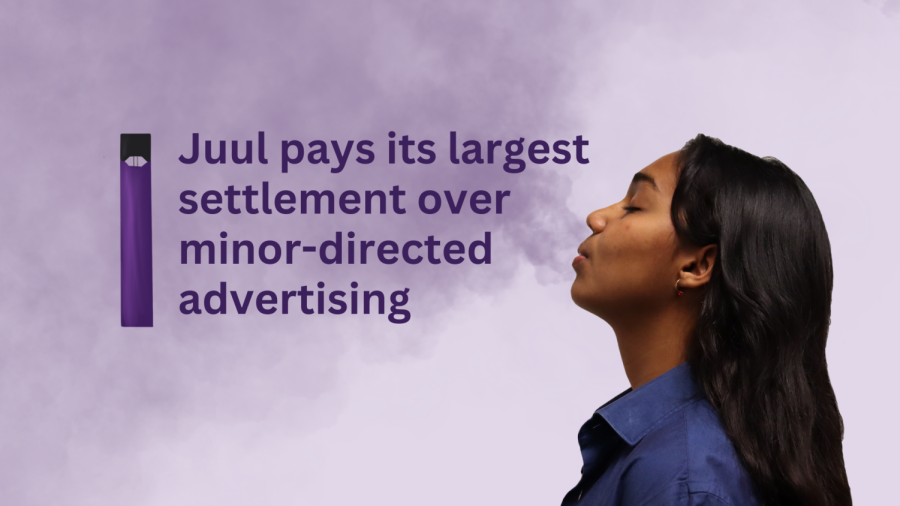Juul pays its largest settlement over minor-directed advertising
Graphic illustration by Inaaya Yousuf and Vidushi Upadhyay. Photo by Inaaya Yousuf.
Juul settled with six states, amounting to $462 million paid for advertising its e-cigarettes to audiences under 21 years prior to its company-wide reset in 2019, in which the company redefined its ethics after criticism.
May 8, 2023
On April 12, California announced that they would receive the largest settlement a state has ever received from Juul Labs. The company settled with six states, amounting to $462 million paid for advertising its e-cigarettes to audiences under 21 years prior to its company-wide reset in 2019, in which the company redefined its ethics following criticism.
“By using advertising and marketing strategies to lure young people to its products, Juul put the health and safety of its vulnerable targets and the California public at risk,” California Attorney General Rob Bonta said to the Mercury News. “Today’s settlement holds JUUL accountable for its actions and puts a stop to its harmful business practices.”
Since 2019, Juul has settled with 47 states over 5,000 lawsuits, amounting to a total of nearly $3 billion. In its latest settlement, attorneys general from California, Colorado, Illinois, Massachusetts, New Mexico and Washington D.C. received compensation for lawsuits in their individual states, with California receiving the largest sum of $175.8 million. California plans to put the money toward education and prevention of e-cigarette use as well as research.
Launched in 2017, Juul quickly found itself at the center of a teen vaping epidemic as its flavored e-cigarettes rapidly rose in popularity among minors, even making its way to Lynbrook’s campus.
“That was when we started doing some education around it and having more training on it from the staff level, so that when fire alarms were going off in bathrooms, for example, we knew what to be looking for and what was happening.” Assistant Principal of School Climate Tara Grande said.
In 2019, an FDA investigation found that Juul was selling its products without appropriate authorization and implied that their products contained less tobacco than they did. Additional criticism and lawsuits from states over various issues resulted in Juul taking on a change in leadership. Under new CEO K.C. Crosthwaite, Juul pledged to earn the trust of the community and rebuild relationships with public-health officials and policy-makers, with its primary goal of preventing the use of e-cigarettes among underage users redefining the brand.
“I felt that the company and the category, quite frankly, needed a reset given the trajectory that we were on,” Crosthwaite said to Bloomberg. “There was clearly erosion of trust that existed for our company and for the category.”
While Juul never explicitly advertised to underage users, their products came in sweet flavors which appealed to the age group; they used young models and celebrity influencers in their ad campaigns; hosted launch parties for products and gave free samples to underage users at events.
“I’m sure that advertising from vape companies affects the number of students who vape, I mean, that’s why they do it: to hook kids young,” Grande said. “That’s why there are so many anti-vaping, anti-smoking commercials directed toward youth: they know that that’s what’s happening.”
One Juul pod, the cartridge containing the flavored liquid, contains as much nicotine as a pack of 20 cigarettes. Prior to a lawsuit from the state of New York in 2019, it was not disclosed on the packaging of Juul products or on Juul’s website that their products contain nicotine, nor did Juul define nicotine as an extremely addictive chemical derived from tobacco. A warning about nicotine is now disclosed on the packaging of Juul products and on the website, with an age-verification pop-up when browsing products on the website as well.
During its 2019 reset, Juul stopped all advertising in the U.S. and has yet to restart it. Additionally, Juul has discontinued all sweet flavors of its vape pens after backlash arguing that these flavors specifically appeal to underage users. The FDA is currently in the process of reviewing Juul after banning their products in 2022 after it alleged that Juul did not provide sufficient data in toxicology reports. While Juul’s products have reentered store shelves, the only flavors available for purchase are menthol and Virginia tobacco.
According to the National Youth Tobacco Survey, underage use of Juul products has declined by 95% since its reset in 2019. However, lawsuits from that era in Juul’s history continue to cost the company billions of dollars. Juul’s leadership has said that it continues to pay these settlements in order to atone for the company’s problematic past and show the public its commitment to transparency going forward.
“With this settlement, we are nearing total resolution of the company’s historical legal challenges and securing certainty for our future,” Juul said in a statement released on April 12. “Now we are positioned to dedicate even greater focus on our path forward to maximize the value and impact of our product technology and scientific foundation.”
Although the use of Juul among underage users has plummeted, underage accessibility to vaping has not halted. Alternative brands, such as Puff Bar, are on the rise. In the 2022 National Youth Tobacco Survey, 14% of high school students and 3% of middle school students reported current use of e-cigarettes, with Puff Bar being the most popular brand.
“Whenever new products come on the market and we start seeing our kids be interested in them, we want to take action to do education and prevent it,” Grande said.
Of those who reported e-cigarettes use, 85% reported using flavored e-cigarettes, most commonly fruit-flavored, followed by candy and other sweet flavors, largely reflecting the legacy of Juul. While no amount of money can undo Juul’s actions prior to 2019, this settlement will contribute to the California government’s efforts to combat underage vaping.



































































